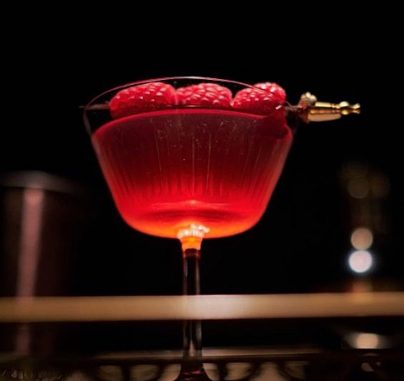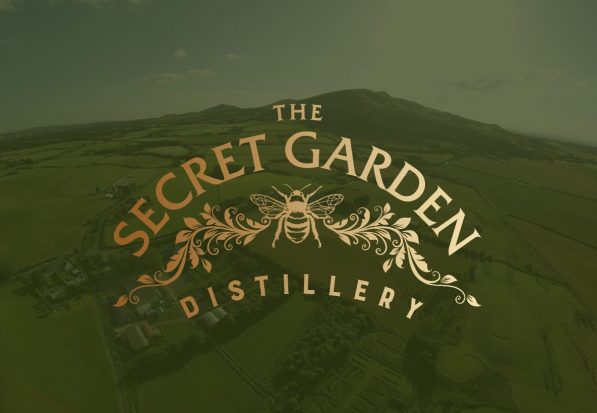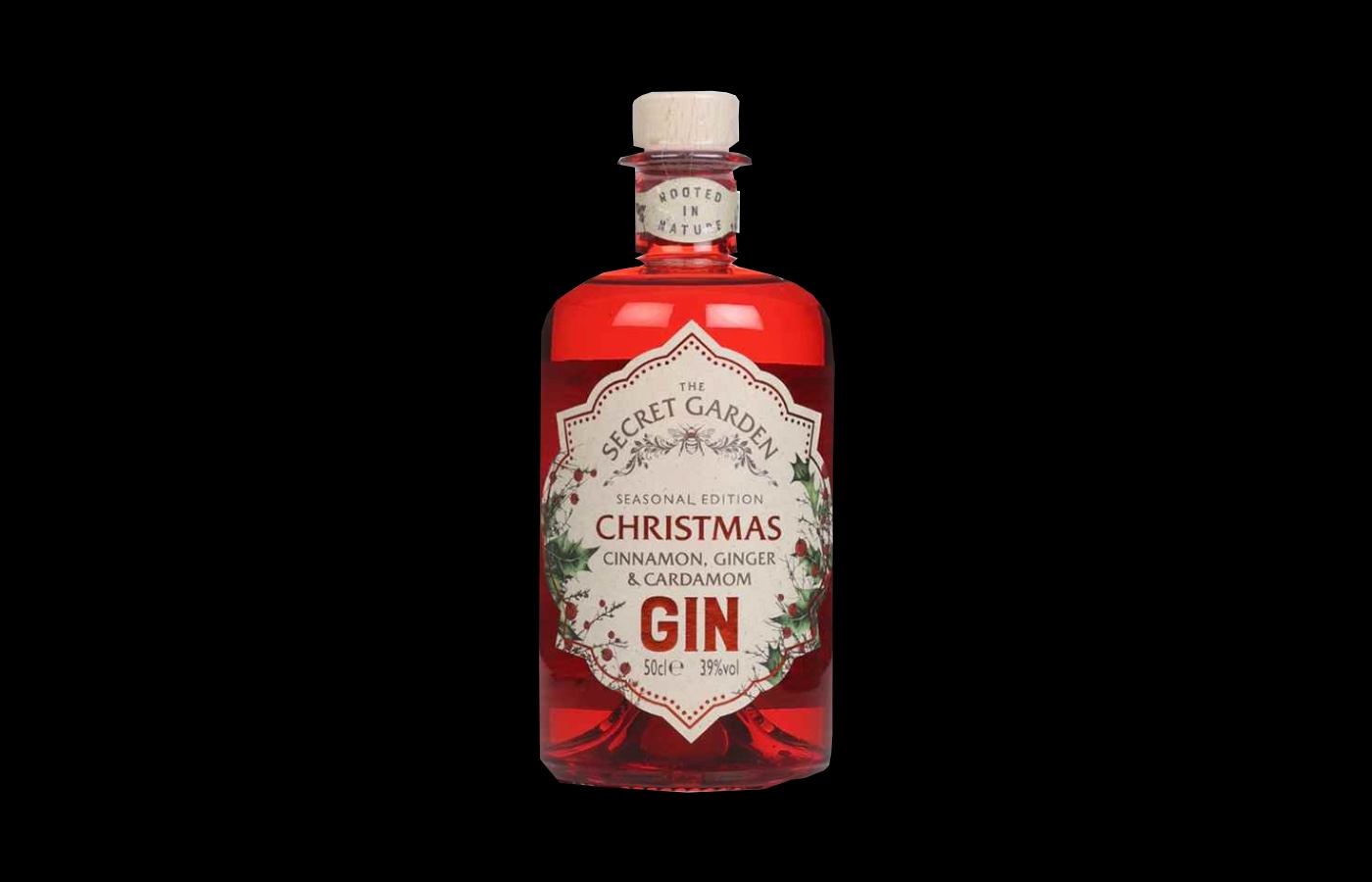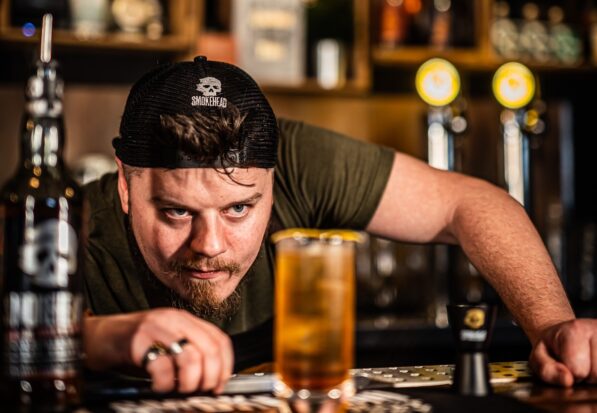Whether you grew up with one or only read about them in books, secret gardens have always promised a world of possibilities. And there is one such secret garden at the foot of the Pentland Hills on the outskirts of Edinburgh that fulfils some of that promise by not only providing a refuge for nature but also a location to distil gin.
Rooted in nature, Secret Garden Distillery was conceived as a place where nature would not only allow the brand to create liquids, seed to sip, but also inspire everything they do.
To find out more, we talked to Daniel Cunningham from Secret Garden Gin about sustainability, botanicals, and, of course, a little Christmas gin.
For more information, go to secretgardendistillery.co.uk
Interviewer (00:41):
Whether you grew up with one or only read about them in books, secret gardens have always promised a world of possibilities. And there is one such secret garden at the foot of the Pentland Hills on the outskirts of Edinburgh that fulfils some of that promise by not only providing a refuge for nature but also a location to distil gin.
(01:03):
Rooted in nature, Secret Garden Distillery was conceived as a place where nature would not only allow the brand to create liquids, seed to sip, but also inspire everything they do.
(01:15):
To find out more, we talked to Daniel Cunningham from Secret Garden Gin about sustainability, botanicals, and, of course, a little Christmas gin. Thank you for joining us, Daniel.
Daniel Cunningham (01:28):
Hi Tiff. Thanks for having me. It's a pleasure to be here.
Interviewer (01:31):
Now the distillery is well known for creating a garden filled with plants that don't use any chemicals. Why was that so important for you guys?
Daniel Cunningham (01:43):
I mean, I guess this is probably one of the most important aspects of our business. By being chemical-free, we are protecting the quality of our soil. So our distillery spans over 7.5 acres, and we haven't used any chemicals on it for the last 40-ish years. W e took over the land in 2012. It was completely overgrown with beautiful wild plants, which was great not only for biodiversity, but for enrichening the soil. Now it lay like this for around 10 years, and the land was used by an organic produce business for 25 years before that. We want to encourage wildlife to keep coming back to our garden, especially bees, um, which are at the core of all beings. They need to be protected, so we want to create a haven not just for them, but for all the species that surround us. Our garden is a sanctuary for plants, animals, and people alike.
(02:41):
By keeping our garden completely natural, we are preserving and enjoying nature in its purest form. Now, growing at mass without chemicals might seem like a bit of a challenge. However, the density of our biodiverse land creates the perfect environment for the 600 varieties that we grow. Our gardeners have spent, you know, a lot of time and effort investigating the best and most natural methods to protect our plants. They have built natural barriers of lavender around our growing beds to attract green flies and disease to them rather than our, you know, precious botanicals that we use in our gin.
Interviewer (03:19):
Are you growing plants soley for the gins, or are you growing botanicals or flowers or things that are far beyond that?
Daniel Cunningham (03:31):
Yeah, so we're growing like a wide variety of botanicals, not only for the gin, but for selling as well. So we originally started as a herb nursery in 2012. So if you are local to the secret garden and you've been to the secret garden before, you will know that you have access to some of the most interesting and wonderful varieties of plants that money can buy. So yes, we've got a wide variety, not only for the gin producing, but for people's gardens to take home and have their own kind of piece of the, of the secret garden with them.
Interviewer (04:03):
Now, I believe you actually grow your own juniper.
Daniel Cunningham (04:07):
Yeah, that's right. So we have over 1,500 juniper bushes growing at the garden. Juniper is actually one of Scotland's indigenous species. You can find it growing in the wild here, and in fact, our recent study showed that Scotland is responsible for over 80% of the UK's Juniper population. However, it is a massive decline due to the introduction of an invasive species of juniper that decimated the local population. This is something that we recognize and we have worked with local organizations in recent years to raise awareness for this. Now, not all of our junipers are the same age. They're about 50% are producing berries right now. They're kind of like grape vines. You need to wait about three years until they become mature enough to bear fruit. We grow a local variety of juniper that can withstand temperatures of up to minus 20 degrees Celsius, which is absolutely perfect for our lowland climate.
(05:01):
You know, we started growing our juniper in 2018, and we started planting them in the middle of April. So we thought that we were, you know, free of any frost scares. However, there was a, um, rather unexpected storm that hit the UK. It was called the Beast of the East, and it was two weeks of below-freezing temperatures in, in snow. So these junipers were pushed to the very limit from day one, and they're continuing to thrive today and, you know, producing some, you know, bumper harvest for us, in particular, this year, which was absolutely fantastic.
Interviewer (05:37):
How difficult is it to stick to your mantra of sustainability while also trying to provide enough botanicals that you would need for the stills?
Daniel Cunningham (05:50):
Our approach just requires our gardeners to think about our garden's health in a different way. There are several natural ways to protect our plants without using harsh chemicals. This way, we can let plants heal plants, and we also use old Victorian methods of hurling to protect our plants from being eaten by the array of wildlife that call our garden home. Essentially, though, we learn from and study our plants so that we know what causes them to thrive, what doesn't, and from there it's pretty simple in a matter of finding the conditions that enables them to grow and thrive.
Interviewer (06:24):
Is the environmental sustainability that you have in the garden taken further into the actual gin production?
Daniel Cunningham (06:33):
Yeah, absolutely is. In simple terms, we endeavor to work with suppliers that are local to the UK so that our goods travel as little as possible. So let's look at our packaging, which is also aligned to sustainability. We use grass labels made with about 30% grass fibre and 70% virgin pulp. To manufacture these compared to conventional labels requires 97% less energy and 99% less water.
(07:00):
Making gin or any spirit will require a high level of energy use and a high volume of water. And this is our biggest challenge. So we are now looking at ways to be sustainable beyond our ingredients, through our distillation process. Last year we dug our borehole on site that provides our distillery with a sustainable supply of natural spring water, which is amazing. You know, we're so lucky where we're situated right at the base of the Pentland Hills, which is our regional park, just on the outskirts of Edinburgh. The water just, you know, trickles down and it kind of rather conveniently gathers it at our garden, which is absolutely fantastic. And by using this, we are lowering our impact as mains water requires a lot of energy to clean and recycle. We are also looking at ways investigating in green energy sources to limit our emissions in the next year to make our site as green as possible.
Interviewer (07:55):
For someone who hasn't seen your garden, why don't you walk us through.
Daniel Cunningham (08:02):
Yeah, sure. So our garden probably isn't exactly what you would expect. We have a focus on wildflowers and champion quirky varieties that most people would brand as weeds. Weeds are super important for promoting our healthy biodiversity and are also a vital food source for wildlife. We want to reverse this message that is ingrained in the attitude of humans around the world that, you know, weeds are bad, weeds are pests, and that they need to be ripped up and poisoned when, in fact, they're actually a fundamental part of every existence as a species. So we encourage people to show them the respect that they deserve. Now, if you're joining us in the middle of July, which is, you know, slap bang in the middle of our growing season, the garden is a mass of colour. We have raised beds of things like Scot's lovage, wood evens, lemon barm, Yaro and hyssops, which the bees absolutely love, by the way, which is amazing.
(08:57):
You can actually, I love watching the hyssops in the middle of the summer because you can just take a seat, sit down in front of them, rest your eyes, and you'll quickly discover that the flower bed just becomes alive with bees. We have about 10 hives on site, and a beekeeper as well, who looks after them. So, you know, it's quite incredible. So our garden is actually split into three main sections. Firstly, we have our gin garden, which is about 75% of our garden as a whole. This is where we grow most of our botanicals that inspire in make up our Gins, including our base botanicals of juniper, winter savoury, and angelica root. We also have a large bed of dark violets, which we describe as our gold dust at the Secret Garden Distillery. This is because they're used to colour our floral gins due to their intense purple pigmentation, you know, and it is quite incredible the colour that these plants can give off. Our gins are actually quite unique.
(09:56):
There's like a natural kind of colour change that takes place when you mix our gins, particularly with tonics. So within flower petals there is a compound called antisynoms and when you combine antisynoms with citric acids or tonic water, it changes the pH level and it changes the colour. So we have Elderflower and Jasmine gin, for example, that goes from a lovely kind of rosé blush to a deep kind of fusia, which is, you know, absolutely stunning. Then we have our apothecary rose garden. We are one of the largest growers of this rose in the UK, and it can only be described as a sea of pink in the middle of July. Our landscapers have also planted the roses in a Fibonacci sequence, which mirrors the shape of a rose when you see it from above.
(10:46):
Yeah, that's right. And the idea is that the kind of path leads back to the beginning because the roses so central to our business as a whole because it was the first gin that we debuted back in 2017. So that is why we've dedicated a, you know, a massive part of our garden to that particular variety. And then finally, our glass house is where we grow the varieties of plants that require protection from the wind and rain, something that we have a lot of in Scotland as you can probably imagine, they also require a warmer climate. So the glass house provides the perfect growing conditions for things like lemon, verbina, mallows, jasmine, and three varieties of grapes. You know, it's quite amazing if you're joining us in August and September when the grapes are, you know, ready to be harvested, they're just like hanging above your head, like all over the places.
(11:33):
It's amazing. It's incredible. Lemon verbena actually is one of my favourite botanicals, and it's definitely a favourite amongst our visitors that we welcome each year due to its intense flavour and intense smell and rough texture. It smells like lemon sherbets, if you're familiar with that, you know, kind of candy that sweet that you had growing up as a kid. And yeah, you kind of run your fingers through it and it releases the natural oils. And this is kind of so important for us achieving that natural citrus flavour in our gins that we all know and love. We can't grow lemons in Scotland very well for reasons that hopefully I don't need to explain why. So Lemon Verna, you know, is we're very fortunate that it kind of thrives under shelter conditions in Scotland. So it's a, you know, it's a big part of our business, for sure.
(12:19):
And over the past year, the demand of our products has grown, and that means that we must start re-imagining our garden and our garden to be as functional, but also as beautiful as possible, to grow as much as we can for our demand. We are actually spending this winter repurposing of our beds to grow more of our most utilized botanicals, like lemon balm, lemon thyme, dark violets and geraniums. We're actually in the middle of, uh, expanding our apothecary rose garden, so, you know, we are one of the largest growers of that rose in the UK and we're about to be even bigger. The guys are hard at work doing that right now, and hopefully by the spring we can, you know, open it to the public, which will be fantastic.
Interviewer (12:59):
Now let's look particularly at the Christmas gin that you guys produce. When did that expression first come off your stills?
Daniel Cunningham (13:08):
Oh, so we started making a Christmas gin in 2018, and basically what we wanted to do was capture the essence of Christmas by using only 100% natural ingredients. Over the past kinda five years, the category has become overrun with products that contain high levels of sugar and artificial ingredients. So we wanted to show, not only the industry, but the world that you can actually achieve these flavour profiles by just using 100% natural ingredients.
Interviewer (13:39):
Now, when you're producing the Christmas gin, obviously it would be very popular amongst consumers, but is it also an on-trade product?
Daniel Cunningham (13:50):
Yeah, I mean, Christmas gin is naturally more successful from a gifting perspective, however there still is a place for it in the on-trade, especially with, you know, seasonal cocktail menus. You know, we've all been into a bar over the holidays and we've seen winter expressions of more of the traditional cocktails, as well as hot serves. So Secret Garden Christmas Gin there's definitely a place for it in that environment for sure. And the hot serve is definitely our favourite amongst our staff. We make it using a combination of hot apple juice, hot orange juice, lemon juice, honey, and all spices. It's amazing. Really, really good.
Interviewer (14:29):
And is it available in a lot of bars in your area?
Daniel Cunningham (14:33):
Yeah, more, it's definitely more localized from an on-trade perspective. We're lucky enough to work with some of the most influential bar groups in Scotland and in the UK as a whole. So to mention anyone, we are actually partnering up with a, a, a really nice kind of host boutique hotel and restaurant called the Rayburn, in an area called Stockbridge in Edinburgh city center where we have a Christmas negroni on the menu, which is just absolutely fantastic, garnish with a slice of orange peel. It's, it's amazing.
Interviewer (15:03):
Now, what sort of flavours should people expect from the Christmas gin?
Daniel Cunningham (15:07):
We wanted to capture the essence of the festive season, so we use the classic combination of cinnamon, cardamine and ginger to achieve this. We do bend the rules for our Christmas gin, however, we stay true to our word when we say that it's 100% natural. So think warm tones of subtle spice and warm Christmas cake harmonized beautifully over those herbal-based botanicals that I mentioned before.
Interviewer (15:35):
Now, how should people use the Christmas gin?
Daniel Cunningham (15:39):
It's definitely a matter of preference. You know, I'm not gonna sit here and tell people how to drink their gin. However, if it was me and if I was drinking it in a gin and tonic, then I would definitely use a light tonic, because we want our gin firstly to really sing in the glass. We want the flavours to really push through. And we also don't want to mask the delicate natural flavors of the gin with a high sugar content. And definitely garnish it with a slice of Orange for sure, which is great. And mentioned a hot serve, with the hot apple juice and hot orange juice and all-spice, which is obviously so popular this time of year where it works an absolute treat and it's definitely a firm favourite if you're bringing it to the dinner table at Christmas time. It's, it's fantastic.
Interviewer (16:25):
Are there any classic cocktails that the gin works particularly well in?
Daniel Cunningham (16:30):
I mean, yeah, so that kind of spicy character of the gin, it lends itself well to the classic cocktails for sure. So Negroni is absolutely, a Martinez is my favourite cocktail, which is essentially a variation on a gin martini only using, sweet vermouth. It works really, really well and it's incredibly versatile, but it also works really, really well in sparkling wine and in Champagne-based cocktails. You know, I wouldn't be afraid to use this in a French 75, for example,
Interviewer (16:58):
What do you want people to take away from their experience with the Christmas gin?
Daniel Cunningham (17:04):
You know, I want our Christmas gin to be something that reminds us of a memorable moment every time they see, you know, the red silhouette. And my advice is, if you are enjoying a bottle of our Christmas gin over the Christmas period with some friends or family, then you know, make sure you do so by turning off your phone and giving a hundred percent of your undivided attention to the conversation. You know, our garden, our distillery was originally designed as a green space for people to escape hectic city lives and disconnect from all that and reconnect to nature and kind of get away from all those distractions that kind of surround us in modern society. So I guess as well, we're, we're not only here to produce great gin, we're here to communicate just how amazing nature is and also create long-lasting memories for our customers.
Interviewer (18:00):
Now I imagine your production numbers of the Christmas gin would've increased year by year. How early do you end up making it?
Daniel Cunningham (18:12):
I mean, for us, Christmas is all year round. Um, you know, we maybe get like a, a 6 to 8 week respite period from January, and then the conversations start up again in February for retailers in the UK listing this in the summer. So we have to start making this the liquid, as you know, as early as July, and we continue to do so up until, you know, the very last day in December when the business shuts for two weeks. So I feel like it's nonstop Christmas over here at the Secret Garden Distillery.
Interviewer (18:42):
How many bottles are you producing per year?
Daniel Cunningham (18:45):
So we're producing around 35,000 bottles of our core products right now. 8,000 of which is from our Christmas gen. We started distilling in 2017, and we've had a global pandemic in between. So there's been a lot of kind of humps and bumps along the way, but, you know, it's definitely our story that, you know, continues our gin to be on an upward trajectory. In our category that's kind of full of gimmicks and unnatural product, a really good story goes a long way, and that's how we are standing the test of time and continuing to grow.
Interviewer (19:32):
Now, with those flavours of spice in the Christmas gin that you described, what sort of foods do you think work nicely with it?
Daniel Cunningham (19:41):
Yeah, I mean, it's, it's incredibly versatile. The kind of spicy characteristics of the products does, of course, lend itself well to your traditional Turkey dinner or, or gooses or beef Wellington or whatever that you have for your Christmas dinner. However, I think it's best enjoyed with dessert, you know, chocolate in particular.
Interviewer (20:04):
Now, if people wanna grab a bottle of the Christmas gin or any of the brands other expressions, where are they available?
Daniel Cunningham (20:14):
If you're in the UK, you can buy our gin on our online store at the secretgardendistillery.co.uk, you can also pop into the Whiskey Shop, who have over 20 stores nationwide. Our distribution is definitely stronger from an independent perspective. We are not in any supermarkets, you know, we're lucky enough to work with some of the best independent retailers across the UK and we have Q Gardens as well. You know, Q Gardens is particularly connected to our story because they share the same values, they have a similar experience. So it's the perfect product for their offering and they carry all of our lines.
Interviewer (20:54):
And have you, do you export much?
Daniel Cunningham (20:56):
Yeah, we do actually. So export has been one of the main drivers for every success. We currently export to 10 countries all over the world, including Switzerland, USA, and Malaysia. It works in any market our Christmas gin, whether it be called winter gin or, or festive gin, but during the winter seasons, our Christmas gin is the perfect way to celebrate the holidays. And looking at our products from like a core perspective of our, you know, our recordings that, that, that we make, Switzerland and Germany are definitely the, the biggest market for us outside the UK. They absolutely love our Apothecary rose and lavender gins
Interviewer (21:34):
Now, you mentioned the US, which parts of that market are you in,
Daniel Cunningham (21:38):
I think we are in five states currently. I know that we're in Texas. I know that we are in Cincinnati and I know that we're in California and we do have plans to expand into other states across the US. You know, gin is an emerging is an emerging category over there. When we were having, the gin boom for the past kind of 10 years, they were seeing kind of amazing growth in, in the likes of tequila and vodka, but now they are beginning to kind of learn from the trends from other markets, in particular the UK. So there's a massive opportunity for us to kind of get after, um, more and more states as time goes on.
Interviewer (22:14):
If people want more information on Secret Garden Distillery, they can, of course, go to your website, which is secretgardendistillery.co.uk or connect with the brands on your socials.
Daniel Cunningham (22:26):
Yeah, that's right. You know, we're on Instagram, and Facebook for sure. If there's anyone listening that's local to Edinburgh, we'd love to come up for a tour then, you know, we do amazing experiences for a very reasonable price across the season. So they run between April and October.
Interviewer (22:46):
Excellent. All right, Daniel, thank you so much for taking the time to speak with us.
Daniel Cunningham (22:51):
Thanks Tiff, really appreciate it. Thank you so much for having me on.









